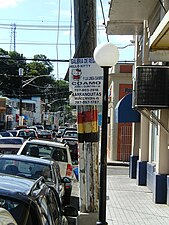Coamo barrio-pueblo
Coamo barrio-pueblo
Pueblo de Coamo | |
|---|---|
Municipality Seat[1] | |
 | |
 Location of Coamo barrio-pueblo within the municipality of Coamo shown in red | |
| Coordinates: 18°04′42″N 66°21′36″W / 18.078375°N 66.360068°W[2] | |
| Commonwealth | |
| Municipality | |
| Area | |
• Total | 0.89 sq mi (2.3 km2) |
| • Land | 0.89 sq mi (2.3 km2) |
| • Water | 0 sq mi (0 km2) |
| Elevation | 397 ft (121 m) |
| Population (2010) | |
• Total | 6,685 |
| • Density | 7,511.2/sq mi (2,900.1/km2) |
| Source: 2010 Census | |
| Time zone | UTC−4 (AST) |
Coamo barrio-pueblo is a barrio and the administrative center (seat) of Coamo, a municipality of Puerto Rico. Its population in 2010 was 6,685.[1][4][5][6]
Due to its historical value, the historic downtown district (pueblo) of Coamo was added to the Puerto Rico Register of Historic Sites and Zones (Spanish: Registro Nacional de Sitios y Zonas Históricas) on July 19, 1995.[7]
As was customary in Spain, in Puerto Rico, the municipality has a barrio called pueblo which contains a central plaza, the municipal buildings (city hall), and a Catholic church. Fiestas patronales (patron saint festivals) are held in the central plaza every year.[8][9]
| Census | Pop. | Note | %± |
|---|---|---|---|
| 1910 | 3,869 | — | |
| 1920 | 4,259 | 10.1% | |
| 1930 | 5,831 | 36.9% | |
| 1940 | 8,691 | 49.0% | |
| 1950 | 11,592 | 33.4% | |
| 1960 | 12,146 | 4.8% | |
| 1970 | 0 | −100.0% | |
| 1980 | 10,244 | — | |
| 1990 | 9,026 | −11.9% | |
| 2000 | 7,573 | −16.1% | |
| 2010 | 6,685 | −11.7% | |
| U.S. Decennial Census 1900 (N/A)[10] 1910-1930[11] 1930-1950[12] 1980-2000[13] 2010[14] | |||
The central plaza and its church
[edit]The central plaza, or square, is a place in the barrio-pueblo for official and unofficial recreational events and a place where people can gather and socialize from dusk to dawn. The Laws of the Indies, Spanish law, which regulated life in Puerto Rico in the early 19th century, stated the plaza's purpose was for "the parties" (celebrations, festivities) (Spanish: a propósito para las fiestas), and that the square should be proportionally large enough for the number of neighbors (Spanish: grandeza proporcionada al número de vecinos). These Spanish regulations also stated that the streets nearby should be comfortable portals for passersby, protecting them from the elements: sun and rain.[8]
Located across the central plaza in Coamo barrio-pueblo is the Parroquia San Blas de Illescas, a Roman Catholic church.[15][16]
Gallery
[edit]-
Street in Coamo barrio-pueblo
-
Street in Coamo barrio-pueblo
-
San Blas de Illescas Church in Coamo pueblo.
-
View of the main plaza or town square of Coamo.
-
Baldorioty Street, one of the oldest streets in Puerto Rico.
-
Hollywood Theater
See also
[edit]References
[edit]- ^ a b Puerto Rico: 2010 Population and Housing Unit Counts.pdf (PDF). U.S. Dept. of Commerce, Economics and Statistics Administration, U.S. Census Bureau. 2010.
- ^ a b "US Gazetteer 2019". US Census. US Government.
- ^ U.S. Geological Survey Geographic Names Information System: Coamo barrio-pueblo
- ^ Picó, Rafael; Buitrago de Santiago, Zayda; Berrios, Hector H. (1969). Nueva geografía de Puerto Rico: física, económica, y social, por Rafael Picó. Con la colaboración de Zayda Buitrago de Santiago y Héctor H. Berrios. San Juan Editorial Universitaria, Universidad de Puerto Rico,1969.
- ^ Gwillim Law (20 May 2015). Administrative Subdivisions of Countries: A Comprehensive World Reference, 1900 through 1998. McFarland. p. 300. ISBN 978-1-4766-0447-3. Retrieved 25 December 2018.
- ^ "US Census Barrio-Pueblo definition". factfinder.com. US Census. Archived from the original on 13 May 2017. Retrieved 5 January 2019.
- ^ GOBIERNO DE PUERTO RICO, JUNTA DE PLANIFICACIÓN DE PUERTO RICO (December 7, 2022). "REGISTRO DE PROPIEDADES DESIGNADAS POR LA JUNTA DE PLANIFICACIÓN DE PUERTO RICO" (PDF). jp.pr.gov.
- ^ a b Santullano, Luis A. (10 March 2019). "La Plaza y la Calle". Mirada al Caribe. Vol. 54. Colegio de Mexico. pp. 75–78. doi:10.2307/j.ctvbcd2vs.12. JSTOR j.ctvbcd2vs.12.
- ^ Pariser, Harry S. (2003). Explore Puerto Rico, Fifth Edition. San Francisco: Manatee Press. pp. 52–55. Retrieved 10 February 2019.
- ^ "Report of the Census of Porto Rico 1899". War Department Office Director Census of Porto Rico. Archived from the original on July 16, 2017. Retrieved September 21, 2017.
- ^ "Table 3-Population of Municipalities: 1930 1920 and 1910" (PDF). United States Census Bureau. Archived (PDF) from the original on August 17, 2017. Retrieved September 21, 2017.
- ^ "Table 4-Area and Population of Municipalities Urban and Rural: 1930 to 1950" (PDF). United States Census Bureau. Archived (PDF) from the original on August 30, 2015. Retrieved September 21, 2014.
- ^ "Table 2 Population and Housing Units: 1960 to 2000" (PDF). United States Census Bureau. Archived (PDF) from the original on July 24, 2017. Retrieved September 21, 2017.
- ^ Puerto Rico: 2010 Population and Housing Unit Counts.pdf (PDF). U.S. Dept. of Commerce Economics and Statistics Administration U.S. Census Bureau. 2010. Archived (PDF) from the original on 2017-02-20. Retrieved 2019-08-02.
- ^ Marisa Gomez and Ester Cardona (July 1984). "National Register of Historic Places Inventory/Nomination: Thematic Nomination: Historic Churches of Puerto Rico". National Park Service. Retrieved June 5, 2023.
- ^ Mari Mut, José A. (2013-08-28). Los Pueblos de Puerto Rico y Las Iglesias de Sus Plazas [The Pueblos of Puerto Rico, and the Churches of its Plazas] (PDF) (in Spanish). Archived (PDF) from the original on 2020-12-14. Retrieved 2021-09-16.







